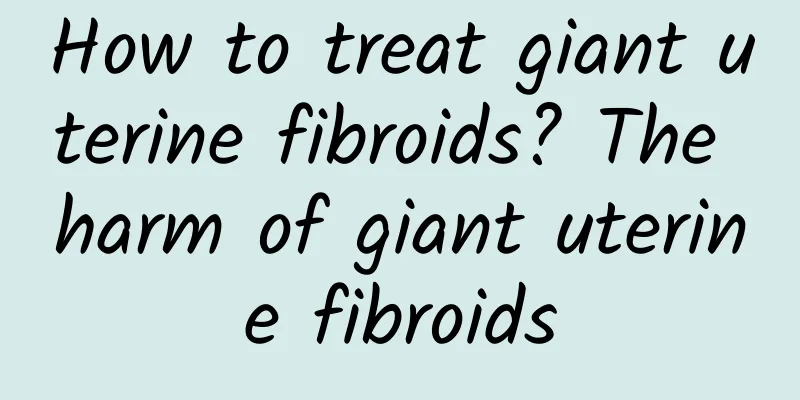How to treat giant uterine fibroids? The harm of giant uterine fibroids

|
Uterine fibroids are a common female disease. There are many causes of uterine fibroids. Uterine fibroids are likely to affect the implantation of fertilized eggs, leading to infertility. Sometimes, even if a woman is pregnant, uterine fibroids can interfere with the development of the fetus and lead to miscarriage. Therefore, it is necessary to treat the disease in time after it is discovered. So, how to treat giant uterine fibroids? There are many treatments for uterine fibroids, but the effect is not very obvious. At present, the use of minimally invasive laparoscopic microsurgery to treat uterine fibroids has become an ideal choice for female patients. For uterine fibroids larger than 5cm, the infertility hospital uses minimally invasive laparoscopic microscopy technology, which integrates examination, treatment, surgery and image display. The surgical area is placed through a small incision on the abdominal wall and the camera is displayed on the TV screen. By observing the TV screen, the doctor can perform myomectomy under direct vision, and there is no need to suture the skin after surgery. Because the incision is very small, a Band-Aid can be applied, and the patient can get up that night or the next morning and eat normally. In addition, minimally invasive laparoscopic microscopy technology will not damage surrounding tissues, keep the female uterus intact, and will not affect fertility. In addition, we should pay attention to the following points at ordinary times 1. It is very important to maintain an optimistic attitude and be happy. It is impossible for everyone to have smooth sailing, and there are pressures and difficulties everywhere. Therefore, we must correct our mentality and face life with an optimistic mood. 2. Adjust your diet. Women should eat more foods containing protein and vitamins. If you have heavy menstruation, eat more foods rich in iron to prevent iron deficiency anemia. 3. If uterine fibroids are found, they should be reexamined every 3-6 months. If the fibroids are significantly enlarged and bleeding is severe, surgery should be performed. 4. Avoid artificial abortion. Artificial abortions can lead to uterine fibroids. Therefore, couples should actively take contraceptive measures to try to avoid or reduce the number of artificial abortions. 5. Actively treat endocrine disorders. Endocrine disorders caused by various reasons should be actively treated, which will increase the probability of inducing and growing uterine fibroids, and avoid unnecessary use of sex hormone drugs. When treatment is needed, you need to take the medicine according to the doctor's advice. |
Recommend
5 steps to say goodbye to big butt with home butt massage
Have you ever calculated how much time you spend ...
What is the difference between bacterial vaginosis and vaginal candidiasis?
What is the difference between bacterial vaginosi...
What are the reasons for irregular menstruation in women? How can we keep menstruation normal?
Women have a few "inconvenient" days ev...
Can I use the air conditioner when I have dysmenorrhea?
If women experience dysmenorrhea during menstruat...
What are the symptoms and treatment of pelvic inflammatory disease?
What are the symptoms and treatments for pelvic i...
How to check if a girl has cervicitis? 4 ways to check if a girl has cervicitis
In fact, in daily life, many female friends do no...
Exercising too much or having a protruding belly? Nutritionists recommend how to supplement fiber to get rid of a "big belly"
Every summer when I go to the beach, I always env...
What is the TCM name for uterine leiomyoma? What is uterine leiomyoma?
Uterine leiomyoma is a common gynecological disea...
What are the benefits of drinking chicken soup after abortion? A complete recipe of soups to replenish qi and blood after abortion
During pregnancy, due to various reasons, I had a...
How to treat vaginitis? 2 common treatments
For many female friends, vaginitis is a particula...
What is laparoscopic myomectomy? What are the advantages of laparoscopic myomectomy?
There are many advantages of laparoscopic myomect...
Is it normal not to bleed after miscarriage? What should I do if I don’t bleed after miscarriage?
Whether it is normal to have no bleeding after mi...
How can women regulate the symptoms of irregular menstruation?
Among women's gynecological diseases, irregul...
Is it necessary to do fluid intubation after ectopic pregnancy?
Is it necessary to do fluid removal after ectopic...
What are the nursing measures for pelvic inflammatory disease?
What aspects should be paid attention to in the c...









